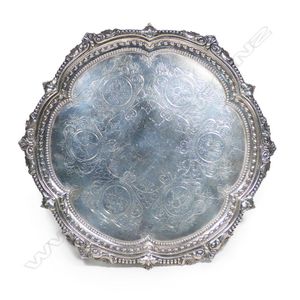Victorian Silver Salver with Floral Engravings
A Victorian silver salver, London 1874 by Martin, Hall & Co. 830gm., the decorative shaped rim with leaf, scroll and bead detail, the flat surface with an unengraved centre framed by six circular cartouches engraved with flowers and fruit within joined scrolling borders, raised on three ball and claw feet, diameter 32 cm.
You must be a subscriber, and be logged in to view price and dealer details.
Subscribe Now to view actual auction price for this item
When you subscribe, you have the option of setting the currency in which to display prices to $Au, $US, $NZ or Stg.
This item has been sold, and the description, image and price are for reference purposes only.
- Salver - A plate or tray used for the formal offering of food, drink, letters or visiting cards, usually of silver plate, silver or silver-gilt. Large, heavy, oblong or oval silver salvers evolved into what we know as trays in the 18th century. Small, flat salvers are known as waiters.
- Victorian Period - The Victorian period of furniture and decorative arts design covers the reign of Queen Victoria from 1837 to 1901. There was not one dominant style of furniture in the Victorian period. Designers used and modified many historical styles such as Gothic, Tudor, Elizabethan, English Rococo, Neoclassical and others, although use of some styles, such as English Rococo and Gothic tended to dominate the furniture manufacture of the period.
The Victorian period was preceded by the Regency and William IV periods, and followed by the Edwardian period, named for Edward VII (1841 ? 1910) who was King of the United Kingdom and the British Dominions and Emperor of India for the brief period from 1901 until his death in 1910. - Engraving - The method of decorating or creating inscriptions on silver and other metal objects by marking the surface with a sharp instrument such as a diamond point or rotating cutting wheel.
This item has been included into following indexes:
